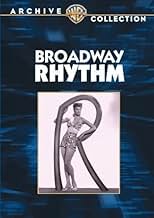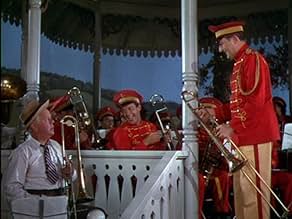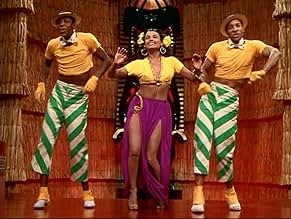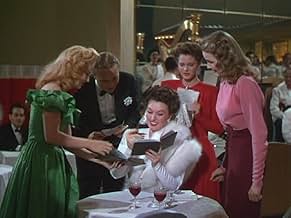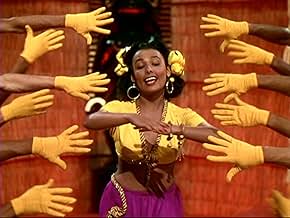A reluctantly-retired vaudevillian clashes with his producer son, who thinks his father's entertainment is passe'--audiences need something more sophisticated. Meanwhile, the producer's fath... Read allA reluctantly-retired vaudevillian clashes with his producer son, who thinks his father's entertainment is passe'--audiences need something more sophisticated. Meanwhile, the producer's father and sister secretly produce their own show.A reluctantly-retired vaudevillian clashes with his producer son, who thinks his father's entertainment is passe'--audiences need something more sophisticated. Meanwhile, the producer's father and sister secretly produce their own show.
- Maggie
- (as The Ross Sisters)
- Aggie
- (as The Ross Sisters)
- Elmira
- (as The Ross Sisters)
Featured reviews
Based on a successful Broadway show, Very Warm for May, that the producers chose to cut to ribbons taking many of the songs out and turning into an ordinary backstage story of a brash blow-hard trying to put on a show.
A big indicator of the lower expectations that befell the property is the cast. None of the top line Metro stars are on board.
While originally intended for Judy Garland the lead is now filled by lesser light Ginny Simms. Simms had a beautiful voice and a lovely face but knowing the part was meant for Judy allows the viewer to consider star quality and the impact one performer makes on screen over another. Whereas Judy was always relaxed, natural and alive when the cameras were trained on her Ginny comes across as stiff and uneasy. You can almost see her counting down until the other person in the scene finishes talking so she can say her lines. However when she sings she's more at ease and accessible. This was to be her big chance at above the title screen stardom but the movie was an under performer and after a few more supporting roles, one in Night and Day showed her to good advantage, she went back to the bandstand. She doesn't ruin the film but she doesn't help it much.
The next performer that indicates the lower expectations of the picture is George Murphy in the lead. A top star in 30's musicals and a fine dancer he had moved down to second leads and B's by this point so his casting in this as opposed to Gene Kelly or Fred Astaire shows the studio didn't firmly believe in the material.
It's not all bad, the supporting cast has a few saving graces, although Gloria De Haven is arch and annoying. Charles Winninger and Rochester are there with their stock but amusing characters and blessedly Nancy Walker adds spice whenever she shows up on the scene, to bad her part wasn't bigger.
As was the custom at the time the film has several specialty numbers and they are a very mixed bag.
The bad: impressionist Dean Murphy while not untalented tries way too hard in his bit. Contortionist sister act The Ross Sisters are remarkably limber but their routine is downright creepy.
The good: Although I'm not a fan Lena Horne comes across well in her two numbers and the great Hazel Scott tears it up at the piano working her special magic.
Filmed in rich eye popping Technicolor this is a pleasant diversion but nowhere near the peak of what MGM was capable of at this point. For that see the same year's Meet Me in St. Louis.
As a result, the film is full of gifted performers unable to bring much life to this routine musical about a producer quarreling with his father over how to produce their next show and walking out on him. Of course, everything is straightened out by the final reel and the show is a smash hit.
MGM produced this in velvety Technicolor with all the trimmings but there's no disguising the fact that the witless script is full of flat lines and only occasionally does a song get that MGM treatment.
George Murphy and Ginny Simms get top billing with Gloria DeHaven, Charles Winninger, Nancy Walker and Ben Blue in good support. Guest star Lena Horne gives the film its most solid moments with two specialty numbers and Hazel Scott does magic with her finger work at the piano. Eddie "Rochester" Anderson provides some comic relief.
But Murphy gets only one dance routine at the finale and Ginny Simms only gets one memorable song ("All The Things You Are") to warble before the show is over. It all has a slap-dash kind of organization, the story flow stopping every few moments to accommodate another frenzied number.
The tiresome script is the problem, lacking wit and originality. Six years later, "Summer Stock" with Judy Garland and Gene Kelly (and Gloria DeHaven) did a much better job with similar material and better songs.
There is a connecting plot, though only the slimmest possible. For me, the movie dragged whenever it stopped the music for a little story updating. George Murphy doesn't really dance much here - just briefly toward the beginning and end - and he does an OK piano medley in the middle. Ginny Simms isn't much of a screen presence, but has a great voice used to advantage. Close your eyes while she's singing and you won't miss much onscreen, other than the costumes.
The highlights are in the supporting cast; great numbers from Lena Horne, Tommy Dorsey, Hazel Scott, and Nancy Walker (though you really have to wait for hers; she's a bit underused here). Really nice work from Gloria DeHaven and Kenny Bowers in their couple of tunes, as well as Walter Long's tap-dancing. The singing-contortionist Ross Sisters are something to see, but the impressionist got on my nerves after a while. (Some of his subjects will not register with viewers unfamiliar with the era; there's a couple of topical jokes elsewhere in the film also.)
And Charles Winninger is a pleasure to watch in a diversion for him; I've rarely seen him in musical roles.
In short, worth seeing for most of the musical segments; the rest is unremarkable.
7 of 10
Did you know
- TriviaNightclub impressionist Dean Murphy plays the Hired Man in a barnyard scene with Nancy Walker. He impersonates several celebrities of the day in the following order: Joe E. Brown, Edgar Bergen as Charlie McCarthy then Mortimer Snerd, Clark Gable, Ronald Colman, Wendell Willkie, Bette Davis, James Stewart, Franklin D. Roosevelt and finally Eleanor Roosevelt.
- GoofsImpressionist Dean Murphy, impersonating Joe E. Brown, is in a barnyard sketch with Nancy Walker. His armpit sweat varies from shot to shot - very wet, a couple smalls spots, dry and wet again.
- Quotes
Jonnie Demming: Here we are - three weeks before the opening and we haven't got a leading lady.
- ConnectionsFeatured in That's Entertainment! III (1994)
- SoundtracksSomebody Loves Me
Music by George Gershwin
Lyrics by Ira Gershwin (incorrectly credited)
Lyrics by Ballard MacDonald (uncredited) and Buddy G. DeSylva (uncredited)
Sung by Lena Horne (uncredited)
Details
- Release date
- Country of origin
- Language
- Also known as
- The Broadway Melody of 1944
- Filming locations
- Production company
- See more company credits at IMDbPro
- Runtime1 hour 55 minutes
- Aspect ratio
- 1.33 : 1
Contribute to this page


